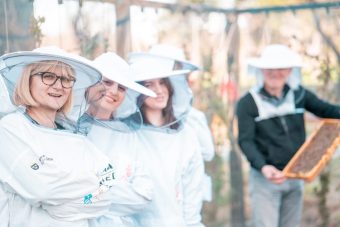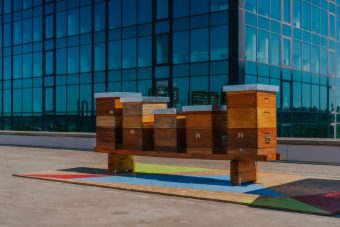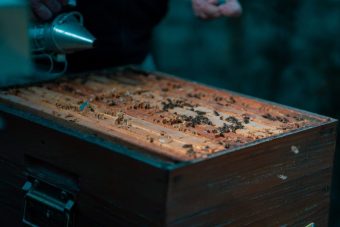
Urban beekeeping involves setting up and maintaining beehives with bees on the flat roofs of buildings in urban areas. Still, we can say that the real answer is environmentally conscious citizens, companies and institutions, those who recognize the importance of bees in the ecosystem, their vulnerability, and who decided to take care of bees and thus contribute to the preservation of the biodiversity of plants, bees and nature.
The bee is the most important insect, responsible for pollinating an incredible 85 per cent of flowering plants. The fact that bees produced every third bite of food speaks vividly about the invaluable role of bees as pollinators of various plant species that people use in their diet. The disappearance of bees in the last ten years has contributed to the fact that more and more people in cities are engaged in beekeeping.
IN FOCUS:
- APPLICATION OF ENVIRONMENTALLY FRIENDLY MATERIALS IN CONTEMPORARY ARCHITECTURE
- WHAT IS YOUR CARBON FOOTPRINT?
- URBAN GARDENS ARE GOOD FOR THE ECOSYSTEM

Why are bees disappearing? The answer is not simple, and the fact that the International Union for Conservation of Nature (IUCN) has included some species of bees on the European Red List of endangered species threatened with extinction shows how serious the situation is.
What are we doing to save the bee? There are various mechanisms and ways in which ecologically conscious individuals, organizations and government representatives try to point out the danger of bees and take concrete actions to preserve them.
As much as the disappearance of bees is a global problem, urban beekeeping requires local action. Urban beekeeping needs a city. The global problem of disappearing bees through the revival of urban beekeeping becomes a local challenge, and its ecological aspect comes to the fore.

One of the pioneers in the development of urban beekeeping in Belgrade is the company MPC Properties, which, in cooperation with the Belgrade Beekeepers Association and the Mad Med Association, has installed as many as 12 beehives on the roofs of its shopping and business centers, including the UŠĆE commercial complex and the Navigator Business Center 2. In just a few months, the bees in these hives produced 130 kg of honey. In addition, as part of promoting and implementing its ESG strategy, MPC launched a series of green events and workshops, including a honey spinning series and a presentation on the importance of bees for children, to introduce them to the topic of urban beekeeping in an inclusive way. At the honey-making workshops, many MPC business partners had the opportunity, for the first time, to witness the process of making honey live, to get to know better how bees are organized, and to taste fresh honey directly from the MPC hives.
The beekeeping workshops for children, Let’s buzz together, were organized in UŠĆE Hub in cooperation with the educational center Košnica Dorćol. They also attracted a lot of attention from the community, where the little ones had the opportunity to visit MPC beehives and plant honey plants in the garden in front of the UŠĆE business complex.
The MPC Properties company gave a good example of concrete actions to save bees from extinction while at the same time improving the environment in cities. If you have a suitable place for a mini apiary, contact the Belgrade Association of Beekeepers and the Mad Med Association, whose experienced beekeepers will evaluate each location and, in cooperation with MPC Properties, propose an urban beekeeping project.
Source: MPC Properties
Read the story in the new issue of the Energy portal Magazine ENVIRONMENTAL PROTECTION



